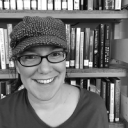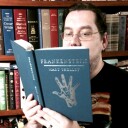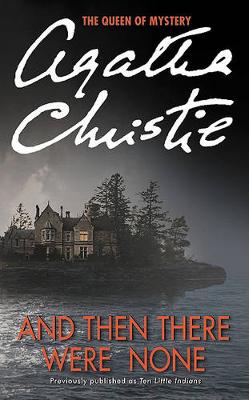
Ten strangers are summoned to a remote island. All that the guests have in common is a wicked past they're unwilling to reveal and a secret that will seal their fate. For each has been marked for murder. As the weather turns and the group is cut off from the mainland, the bloodbath begins and one by one they are brutally murdered in accordance with the lines of a sinister nursery rhyme.
In writing the stage version of her most successful and darkest novels during the Second World War, Agatha Christie responded to the mood of the times by introducing a more positive ending. The play was a smash hit in the West End and on Broadway. The alternate version of the play's ending, drawn from the novel and using entirely Agatha Christie's own words, is now available in this updated edition
- ISBN10 0062073486
- ISBN13 9780062073488
- Publish Date 29 March 2011 (first published 1 January 1972)
- Publish Status Active
- Publish Country US
- Imprint HarperCollins Publishers
- Format Paperback
- Pages 320
- Language English
Reviews


celinenyx
I found the narration to be a little bit bare-bones - it was almost written like a play at some points. The mystery itself was enthralling, however, and I didn't guess who was responsible at all.
---
Content warnings: on-page suicide, murder, murder of child.

HekArtemis

readingwithbecs
The plot of this book is really interesting. Ten people trapped on an island. All of them have a wicked past and only death is in store for them. This book was so creepy, and a perfect October read.
What I liked:
- An interesting plot that immediately makes you interested in what's going to happen
- It was fast pasted
- The element of trying to figure out what is going to happen next and who's the murderer
What I didn't like:
- Right of the bat we are introduced to 10 different characters, and (at least for me) it's hard to remember who is who.

Leigha
Finally read my first Christie novel (and one of the titles on this year’s Beat the Backlist). Yay, me! I’m happy to report this classic lives up to the test of time. It’s a quick, short read focused on the slow psychological unraveling of ten strangers as their past transgressions come to life. With a haunting and atmospheric setting, it kept me on the edge of seat until the very end.
The point-of-view jumps between all the characters, but I’d say the most time is spent in Vera Claythorne’s head. It was fascinating watching each of the characters coming to terms with their fate (as well as the past that lead them to this point). I do think the ending could have been handled differently. The 2015 mini-series adaptation’s ending is impactful in a way the book’s ending is not.
tl;dr A classic mystery thriller living up to the test of time with memorable characters and a surprising plot twist.

jamiereadthis
“He was not afraid of danger in the open. Only danger undefined, and tinged with the supernatural.”
Well played, Agatha Christie. And well read, Dan Stevens. Very glad I did the audio on this.
I love a locked-room mystery, but it’s rare that one can keep me guessing. I made two guesses during the book, and one of them was right, but the fact I wasn’t sure right up to the end was a rare treat indeed.
In fact, I have a good feeling I’ll listen to this one again in the future, and it will be just as interesting knowing whodunnit.

Bianca
Ten little Indian boys went out to dine; One choked his little self and then there were nine.
Nine little Indian boys sat up very late; One overslept himself and then there were eight.
Eight little Indian boys travelling in Devon; One said he'd stay there and then there were seven.
Seven little Indian boys chopping up sticks; One chopped himself in halves and then there were six.
Six little Indian boys playing with a hive; A bumblebee stung one and then there were five.
Five little Indian boys going in for law; One got in Chancery and then there were four.
Four little Indian boys going out to sea; A red herring swallowed one and then there were three.
Three little Indian boys walking in the Zoo; A big bear hugged one and then there were two.
Two little Indian boys sitting in the sun; One got frizzled up and then there was one.
One little Indian boy left all alone; He went and hanged himself and then there were none.
— Brilliant and compelling murder mystery!

brokentune
It is difficult to review And Then There Were None without giving away the plot or the mystery. Suffice it to say that in typical fashion Christie assembles a group of colourful characters in a confined space and confronts them with a mystery to which there seems no logical solution.
What sets this novel apart from her other books is that each of the characters seems to have something lurk in their past – something that blemishes their character. So, whilst trying to solve the mystery of the main plot, Christie also tempts us to pass judgement on each of the characters we meet and assess whether they have been guilty of whatever it is that the narration implies they might have done.
Or have they done anything dubious at all?
If you’re looking for a dialogue-driven whodunnit with a barrel full of red herrings, you’re in for a treat.
“But no artist, I now realize, can be satisfied with art alone. There is a natural craving for recognition which cannot be gainsaid.”

Mercy
Reseña completa: http://thebooksaremylife.blogspot.com/2014/06/resena-diez-negritos-agatha-christie.html

Michael @ Knowledge Lost
And Then There Were None was originally titled Ten Little (I would rather not say) after the British nursery rhyme. The US edition used this title (which is also the last line of the rhyme) as well as changing the song to Ten Little Indians. Once again the novel was revived and now the song title has been changed to Ten Little Soldiers. Apart from the offensive name of the book originally, this novel was wildly successful and introduced a very common crime trope into the world. Ten people trapped in a house on an island trying to work out who is killing them off one by one. I’m sure you can think of many films, shows and books that have paid homage to this theme.
This classic crime novel looks at the idea of administrating justice; who has the right to judge others, and what happens when the law fails. I’m going to try to avoid spoilers and tell you who the killer is but most people would have read this and probably remember who the perpetrator was. The killer believes the others are complacent and in most facts while they deny being guilty publically are living tormented lives. Not everyone, but it was interesting to see that kind of turmoil and I was a little upset to see that wasn’t explored in greater detail. Having said that, I think the torment played out more in the symbolism and motifs. I’m thinking about the dreams and hallucinations (the guilty consciences of the victims are explored here) or the storm; a symbol of violence that cuts them off from the world.
The killer has set out to commit the perfect crime and it looks good on paper but I never really bought into it. While reading this novel I had a feeling that the cosy crime approach is playing against the story. If you think about the mess made from the violent murders, wouldn’t help the police work out what happened in the end? I’m sure they wouldn’t rely on the handwritten accounts, the evidence would be inconsistent. Making this far from a perfect crime (sorry this is hard to explain without spoilers).
This was my first Agatha Christie novel and while I enjoyed it there is one thing that frustrated me. I hate crime novels that hold back important pieces of evidence and expect the reader to work out what happened. I always feel like the author is trying to be smug but really it is just poorly executed writing. It wasn’t so bad in this novel but I get the feeling it is a common occurrence in all her novels and I can’t stand that. You have to make a great protagonist to make up for the withholding of information. It works better as a first person narrative; the unreliable narrator is more likely to forget to tell you important clues.
I will read some more Christie, I hope I’m mistaken about the withholding of clues. And Then There Were None had no real protagonist but maybe a Hercule Poirot, Miss Jane Marple or Tommy and Tuppence mystery hide this a little better. I suspect Murder on the Orient Express will be my next Agatha Christie read but who knows. I prefer my detectives a little more Hard-Boiled so it might be awhile between Christie novels.
This review originally appeared on my blog; http://literary-exploration.com/2013/12/29/book-of-the-month-and-then-there-were-none/
